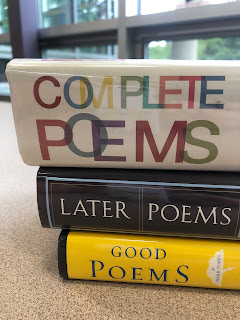How To Find Poetry and Why You Might Need Some
At the reference desk, I love to hear, “Do you have a poetry section?” We certainly do! I look after the poetry collection at the West Windsor branch, so I love to introduce it to library patrons. I have noticed that, while patrons looking for novels or biographies tend to want a specific book, poetry seekers often want to browse. In the mood for poetry? Here is my guide to browsing.
Not all our poetry is in one place. It is mostly in the 800 section of the Dewey Decimal System, and begins in the 808s, which includes anthologies and collections with multiple literary genres. Then, collections by individual American poets are found in 811, organized by last name. 821 is English (and Old English) poetry, 831 German poetry in translation, 841 French poetry in translation. Are you seeing a pattern here? 851 Italian, 861 Spanish and Portuguese, 871 Latin, and 881 Greek and related Hellenic Languages – all in English translation or bilingual editions. Now, Mr. Melvil Dewey was a privileged Victorian-era man, so you can see which literatures were important to him. The “others?” Those are all grouped in the 890s. These books might not follow the same numbered scheme, but they are still valued parts of our collection:
- 891 East Indo-European & Celtic literatures
- 892 Afro-Asiatic literatures
- 893 Non-Semitic Afro-Asiatic literatures
- 894 Literatures of Altaic, Uralic, Hyperborean, Dravidian languages; literatures of miscellaneous languages of South Asia
- 895 Literatures of East & Southeast Asia
- 896 African literatures
- 897 Literatures of North American native languages
- 898 Literatures of South American native languages
- 899 Literatures of non-Austronesian languages of Oceania, of Austronesian languages, of miscellaneous languages
There is one more place to find poetry in the library: the new books section! At the bottom of this post, I’ll list some exciting new poetry that I selected for the library.
Maybe you’d like to read more poetry but you aren’t sure where to start. How do you find poets to read? One way is to open a familiar collection that you like and flip to the acknowledgements page in the back. Poets will thank their families and partners, and will also thank their mentors and friends: lots of poets! Poets who are friends will not necessarily have the same poetic style or voice, of course, but you will often find poets who are in conversation with one another. Reading anthologies is another good way to find new poets: note the names of all the poets you like, and a librarian can help you find more of their work.
Despite claims to the contrary, poetry can be useful. There are occasions throughout the year and throughout our lives that call for a poem or two: weddings, anniversaries, holidays, life transitions, and simply marking the seasons can all be enriched by poetry. Sending a poem to a friend who is going through something – something joyous or something difficult – is a loving act, and an act that you can do for yourself, too. For finding poems on a particular topic, you can look in Bartlett’s Poems for Occasions 9780374292744. Organized into five parts – Cycles of Nature, the Round of the Year, the Cycles of Life, the Human Condition, and Public Moments and Ultimate Matters – the volume includes hundreds of poems by familiar poets on topics like love, retirement from work, friendship, and farewells.
We also have an elegant, pocket-sized volume called Mourning Songs: Poems of Sorrow and Beauty, edited by Grace Schulman 9780811228664. These poems might be a great comfort to you in a sorrowful time. You could copy one or two to share with someone else who is grieving. For more on finding meaning and connection through poetry, check out The Wonder Paradox: Embracing the Weirdness of Existence and the Poetry of Our Lives by historian and poet Jennifer Michael Hecht 9780374292744. Hecht’s previous work has been about the history of religious doubt and atheism, and this book uses poetry as a way of “marking time with calendars, carving out space for contemplation, creating connection, reinforcing legacy and morality.” She includes poems in each chapter, linked to spiritual needs.
Those wanting to learn more about poetry and to read it with others, can join MCLS’s two poetry groups. Here at West Windsor, the Poetry Reading Group meets the second Saturday of each month at 2pm. They read and discuss four pages of poetry by a celebrated poet. The Lawrence branch hosts Poetry Circle https://mcl.org/events/poetry-circle/ twice a month: second Thursdays at 6:30pm to read and discuss poetry, and first Tuesdays at 3pm to critique members’ poems in progress.
As promised, here are some recently published poetry titles in our collection. If you want more, ask a librarian. And if you want to share your favorite poetry collections, write them in the comments!
What You Want by Maureen N. McLane – “What You Want is a book of core landscapes, mindscapes, and shifting moods. Meditative, lyrical, alert to seasons and pressures on our shared life, McLane registers and shapes an ambient unease.”
Skeletons by Deborah Landau – “Witty and glam, Skeletons is a prismatic collection which shrugs off even the most disillusioned nihilist with humor and intimacy.”
Suddenly We by Evie Shockley – “In her new poetry collection, Evie Shockley mobilizes visual art, sound, and multilayered language to chart routes towards openings for the collective dreaming of a more capacious ‘we.’”
Dragons by Devin Johnston – “Attentive to both the physical world and our place in it, [Johnston’s] arresting images of nature and human life ring with quiet power.”
Hydra Medusa by Brandon Shimoda – “Part coping mechanism, part magical act, Hydra Medusa was composed while Brandon Shimoda was working five jobs and raising a child--during bus commutes, before bed, at sunrise.”
- by Corina, West Windsor Branch






Comments
Post a Comment